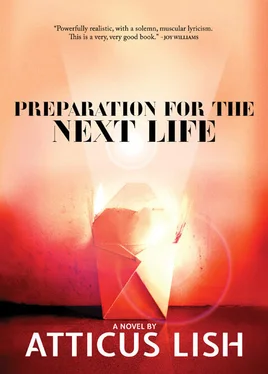Where we going today? he demanded.
Enormous crabs with long spider arms bent and hooked in in the tanks in the window of the Favor Taste Restaurant. At a lot where they did recycling called Andy Metal, a man in a dust mask threw a piece of aluminum up in the air and it landed on top of a mountain of other scrap and stayed.
Perma Base cement board, Super-Tek one-step thin-set mortar, Vision-Pro vinyl siding, Lehigh Portland cement, angle iron, hubless pipe UPC. All of it untended, Jimmy noticed.
Dark 5'3" kids with earrings went by. One wore yellow high-tops with a swoosh.
Golden Fields vegetables. North Shore laundry bags with black grease on the bottoms of the bags piled outside the side entrance of a restaurant where the kitchen boys were sitting on the concrete.
Women walked on high heels across the boulevard, walking as if they were sick, as if they had been sold into geisha slavery.
Jimmy watched.
The onrush of the Chinese. Their scuffing, heedless, lobotomized walking, as if retarded, as if forced to ingest pesticide as children. Women with wicked slant eyes, the faces of evil stepmothers. A pinched, insane or troubled face, the brow pinched, struggling with a constant problem, unable to think, blocked by something lodged in the brain above the eyes. They were pregnant. They pushed a baby carriage, held a child’s hand, pulling a chain of children holding hands across the sidewalk.
A sign outside a filthy doorway said Slimming Hot Wrap, Diamond Peel Facial, Acne Facial, Sensitive Facial, Bodywork.
He carried a sink into someone’s house and held it while Patrick spun the fasteners underneath. They put a bead of silicon between the porcelain and the wall. Patrick turned the faucet and the water came out, hit the sink, and went down the drain.
On the ride back, Jimmy said he was aware that they somehow had found the cash to renovate the basement while his room had holes in the walls. He understood — wink, wink. It was the same thing he would have done. It was a chance to make a buck.
Jimmy did not tell Patrick this — he watched who he said this to — but once when Erin and a few of her friends were hanging around the house and the subject of the war came up, Jimmy said that it was a scam.
Like how?
Like anything. For money.
Like you think they’re profiting?
Jimmy, eyes narrowed, drinking a beer, made a face, a face that said of course, it was so obvious how could you be such a fool that you would think otherwise. His disgust was not with the profit motive but with the naivety of the question.
One of them said he knew someone who, because he had been in Vietnam, knew what happened when planes hit buildings and this was not what had happened on 9/11, the planes had not been vaporized completely, which would have happened. Rather, pieces of the fuselage had been found. This proved that it was not what we were all told it had been! Do you think 9/11 was an inside job?
Obviously.
That’s so fucked-up, they said with awe and delight.
Skinner met Jimmy in the following way:
Skinner had become aware of someone new in the house. He had been hearing an unfamiliar voice through his ceiling, that of a man without a brogue. The man was just a set of footsteps to him, a weight on the floor. He didn’t know who he was.
He went to the bodega on the corner where the train tracks came in. The bodega sold waterpipes lined up in the window like rifles in an armory. Skinner paid for a pack of Camels. A trace of blue curled down the box like smoke to indicate the mentholated flavor. He put the pack in his pocket and smoked one cigarette, staring at Northern Boulevard. A broken parking meter had a jacket tied around it. After his cigarette, he began walking back to his basement. He went past the Dutch houses and down the line of still-bare trees under the rain-heavy sky.
He neared the Irish bar, where a guy in black urban combat gear — loose-fit denim, Timberlands, vest, and SWAT-style ball cap — had a chain wrapped around his knuckles, holding a tiger-striped pit bull on a leash.
A big guy came striding around the corner with the energy of a man about to chop down an entire forest singlehandedly. He bounced up and down as if on springs, his long hair swinging back and forth, the plane of his face lifted displaying the short lines of his mouth and eyes. He was over six feet tall, weighed two-twenty. The beard on his face made him look like a 70s biker. Skinner was struck by an unusual detail: he was wearing a red bandana tied around his thigh. He entered the bar, handing off his lit cigarette to the pit bull’s owner, who took it without a word, presumably to hold for him until he returned.
The same evening when Skinner went outside to watch for Zou Lei coming up Sanford Avenue, a figure caught his eye. It was a man walking far away down the avenue, passing in and out of trees — probably half a mile away in the dusk — nearly out of M16 range — but the way he walked was unmistakable. It was the man from the bar, and Skinner had seen him twice in one day.
Then on a weeknight towards the end of the first week in April, Skinner saw him a third time as he was coming home. This time, the Long Island Railroad had just roared by through the just-beginning-to-bloom trees. The noise had made Skinner flinch and when he looked up, the man appeared, passing in front of a white house. He was slightly ahead of Skinner, who recognized him and watched him indirectly. They crossed 158 thStreet together and their paths started converging on the Murphy’s driveway. It became obvious that they were both going into the Murphy’s house. Neither spoke. The man went first, and Skinner followed behind him.
Once they had gone in, Skinner would hear him talking to Erin, would hear his footsteps go into the upstairs apartment where they would become the footsteps with which he was growing familiar overhead, and he would realize who he was in the family: he was Mrs. Murphy’s son, and he was living here, he was the weight on the floor.
Before this, in the moments while they were negotiating the door and their sudden proximity to one another, Skinner would perceive him for the first time from close range. It was an indirect seeing, an impression of a stranger in the gloom of the entryway, a tall presence elevated above him by the landing.
The guy had left the door open for him but hadn’t held it.
Good looking out, Skinner said, and the man looked down at him as if the slightest pleasantry was unheard-of where he was from.
ZOU LEI TOLD SASSOON that she would cover Zhang Zhuojin’s shift on Sunday, as long as she would get paid for the extra hours. She made a specific point of asking Sassoon whether the extra hours would be recorded. Sassoon irritably dismissed her concerns, but on Sunday Zhang Zhuojin arrived anyway, which led Zou Lei to wonder which of them was getting paid. She urged Zhuojin to go home, but she refused and suggested that Zou Lei was attempting to con her in some way.
Zou Lei wrote both their names in the same square on the schedule and wrote We Are Both Here and drew an arrow to their names.
She asked Zhuojin if she minded letting her run the steam table.
I don’t control you, Zhuojin said.
Business was slow that afternoon and the bosses were not there, but despite this, an unaccountable stress prevailed. As Zou Lei stood at the line, she could hear Zhuojin in the back smashing steel pots around beneath the slow drip of the Taiwanese pop music coming out of the speakers in the ceiling. She claimed she had to make ten gallons of soup, a product that Zou Lei had never known them to sell. Only one customer came between two and four p.m. and he asked for yuk haam or mincemeat. Zhuojin understood his meaning and insisted that they make it for him. Towards quitting time, she came running from the back carrying a smoking steel pot, the veins in her throat standing out above her tendons, and dumped its liquid contents in a pickle bucket. A tongue of heat rose up on the stainless refrigerator door. Zou Lei told her she needn’t have carried that heavy thing alone. She could have burned herself. Looking in the bucket, she saw the liquid still turning over on itself, pieces of black material that she identified as fish skin churning up from the bottom.
Читать дальше












